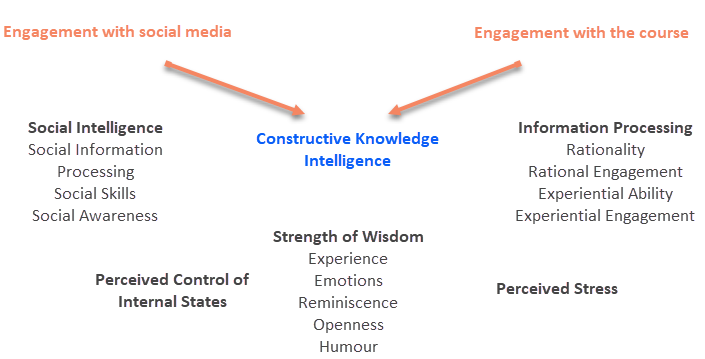Research Aim
The 21st Century has been characterised by an increased reliance on technology for a wide variety of every-day tasks influencing human social and cognitive ability developments (van Laar, van Deursen, van Dijk & de Haan, 2017). Higher Education courses are designed to allow students to construct and apply knowledge in a wide variety of real-world contexts. It also allows students to develop digital skills applicable in their profession and society demands communicating their understanding, views and ideas to online world by using different digital media (e.g., blog, wikis and audio-visual presentation) (Reyna, Hanham, Meier, 2018). Students could work both independently and collaboratively by exchanging views on topics in order to construct collective knowledge as a dynamic and interactive social and cognitive process (Kimmerle, Moskaliuk, Oeberst & Cress, 2015). The collective knowledge construction of new information is developed when the members of a social system (e.g., class cohort) externalise their individual thoughts and knowledge (student cognitive system) through a communication mode process. By following this process, the whole class assimilate and accommodate new knowledge and an adaptive knowledge evolution takes place. Collective knowledge intelligence could be also developed through individulas’ participation in an informal environment (social media online groups) (Kimmerle, Cress & Held, 2010).
The aim of this project is to explore the mechanism of collective knowledge intelligence comparing formal University online activities through discussion forums, wikis and/or chat opportunities with informal activities through social media posting and sharing information exchanging processes. Specifically, the objectives of this investigation are to:
i. explore how individuals’ information processing styles, social intelligence and stress state influence knowledge construction process through formal (University) and informal (social media) online activities;
ii. explore how individuals’ openness, humour, experience, emotions and reminiscence may influence students’ engagement in formal (University) and informal (social media) online activities; and
iii. associate students’ engagement in collective knowledge intelligence with formal (University) and informal (social media) activities.

Institutional Review Board Statement: This study was conducted according to the guidelines of the Declaration of Helsinki, and approved by the Institute of Life and Human Sciences Research Ethics Committee (School of Psychology) of the University of Liverpool (Protocol code: 8257 and Date of approval: 5/01/2021).
References
Kimmerle, J., Cress, U., & Held, C. (2010). The interplay between individual and collective knowledge: Technologies for organisational learning and knowledge building. Knowledge Management Research and Practice, 8, 33–44.
Kimmerle, J., Moskaliuk, J., Oeberst, A. & Cress, U. (2015). Learning and Collective Knowledge Construction With Social Media: A Process-Oriented Perspective. Educational Psychologist, 50(2), 120–137.
Reyna, J., Hanham, J., & Meier, P. (2018). The Internet explosion, digital media principles and implications to communicate effectively in the digital space. E-Learning and Digital Media, 15(1), 36–52.
van Laar, E., van Deursen, A.J.A.M., van Dijk, J.A.G.M., de Haan, J. (2017). The relation between 21st-century skills and digital skills: A systematic literature review. Computers in Human Behavior, 72, 577–588.